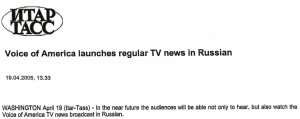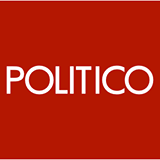BBG Watch Media
James Panichi and Alex Spence report in Politico Europe Edition that “To counter Kremlin crackdown, the BBC aims for a TV channel to promote ‘democracy and liberty.'” The BBC said Monday it wants to set up a Russian-language TV channel to promote “democracy and liberty” and counteract the Kremlin’s crackdown on domestic media. “The broadcaster will also use Internet platforms, such as YouTube, and supply news bulletins to channels in Russia’s neighbors,” Politico reported.
“The planned expansion, five years after the BBC stopped Russian radio broadcasts because of small audiences, is partly an attempt by the corporation to highlight its value to the U.K. government, which is reviewing its operations and funding,” Politico report says.
READ MORE: BBC enters Putin’s media war – POLITICO.
BBG Watch Commentary
BBG Watch is noting that BBC’ reference to promoting “democracy and liberty” is significant. Such language runs counter to sentiments being expressed by what appears to be a small group of Voice of America (VOA) English newsroom staffers who see themselves as news reporters rather than U.S. government employees, which they are, required to advance the Broadcasting Board of Governors’ (BBG) mission. The BBG’s mission is “to inform, engage and connect people around the world in support of freedom and democracy,” according to a statement on the BBG website.
The Voice of America is required to observe the VOA Charter, a U.S. law which includes a provision “to present the policies of the United States clearly and effectively, and … also present responsible discussions and opinion on these policies.”
“We ask for a swift and complete renunciation of the idea that VOA would engage in countering violent extremism,” several VOA English newsroom staffers reportedly wrote recently in a draft petition to the BBG. They also seem to be opposed to the idea of “countering” Russian propaganda, but these views do not appear to be widely shared by VOA foreign language services.
The U.S. Congress, which funds BBG and VOA is dissatisfied with both and wants to reform the agency. The BBG also oversees Radio and TV Marti, Alhurra TV and Radio Sawa to the Middle East, Radio Free Europe/Radio Liberty (RFE/RL) and Radio Free Asia (RFA). A bipartisan bill to reform the BBG is pending in the House of Representatives. The BBG’s annual budget is about $740 million. Journalists working for BBG’s non-federal media outlets, such as RFE/RL and RFA, do not appear to have any problems with countering propaganda and violent extremism.
 Voice of America had a 30 minute Russian-language satellite television daily live news program which was terminated in 2008 shortly before the Russian military attack on Georgia. The VOA Russian TV news program was launched in 2005. The Broadcasting Board of Governors’ (BBG) International Broadcasting Bureau (IBB) officials also ended VOA Russian-language radio broadcasts in August 2008 a few days before the Russian military occupied parts of Georgia.
Voice of America had a 30 minute Russian-language satellite television daily live news program which was terminated in 2008 shortly before the Russian military attack on Georgia. The VOA Russian TV news program was launched in 2005. The Broadcasting Board of Governors’ (BBG) International Broadcasting Bureau (IBB) officials also ended VOA Russian-language radio broadcasts in August 2008 a few days before the Russian military occupied parts of Georgia.
In October 2014, “Current Time,” or “Nastoyashchee Vremya,” a 30 minute television news in Russian was launched by the BBG as a joint production of Radio Free Europe/Radio Liberty and the Voice of America undertaken in partnership with public and private broadcasters and Internet portals in Georgia, Estonia, Latvia, Lithuania, Moldova, and Ukraine. The program does not specifically target audiences in Russia.
A former high-level BBG official said that the U.S. broadcasting agency can’t get powerful programming on the air in a timely fashion or of the quantity needed in response to President Putin’s propaganda. The former official blamed it on a leadership vacuum at the BBG, VOA, and RFE/RL. New BBG CEO John Lansing is expected to start working next Monday.
The Economist
More details about BBC expansion plans in Russia and elsewhere were reported by The Economist.
“Most eye-catching were the announcements on the World Service, the BBC’s international operation. Arguing that it had a mission to uphold the values of “democracy and liberty”, the corporation said it would set up new shortwave services to broadcast into those countries with a deficit of both, namely North Korea, Eritrea and Ethiopia. It will boost its digital presence in Russia, where it may set up a satellite-television channel, and beef up its Arabic service. Furthermore, Mr Hall asked the chancellor to help pay for all this—cheekily, as the cost of the World Service, about £240m a year, was transferred from the Foreign Office to the BBC only last year.”
READ MORE: London calling, The Economist, September 12, 2015
